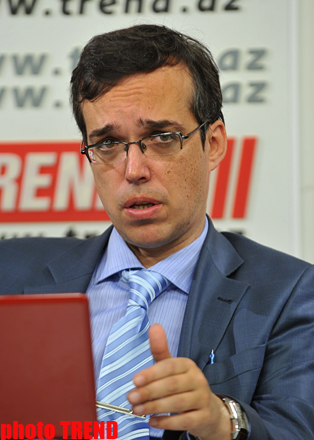Azerbaijan, Baku, April 19 / Trend E. Tariverdiyeva /
The European Parliament's resolution on EU negotiations on an association agreement with Azerbaijan and Armenia is as a result of the total success of Azerbaijani diplomacy, deputy dean of the History Department of Moscow State University and member of the Trend Expert Council, political analyst, Alexei Vlasov said.
"Of course, the moral success has been achieved by the Azerbaijani side especially regarding the issue of illegal settlement," he told Trend.
The European Parliament adopted a resolution on EU negotiations on an association agreement with Azerbaijan and Armenia which reflects the respect for Azerbaijan's territorial integrity, spokesman for Foreign Ministry Elman Abdullayev told journalists on Wednesday.
The resolution was adopted at a session of the European Parliament in Strasbourg.
It is noted that an associative agreement with Azerbaijan and Armenia will not be signed within the EU Eastern Partnership until the Azerbaijani occupied territories are liberated and pass to Azerbaijan's control and refugees return to their native land.
The document also states that the occupation of the territory of one state by another is a violation of international principles and is contrary to the fundamental principles of the EU Neighbourhood Policy and harms Eastern Partnership programme.
The document indicated the need to investigate the facts on illegal settlements in Azerbaijan's occupied territories.
On the other hand, the format of the Eastern Partnership is too loose and amorphous for these decisions to push the parties towards compromise and Yerevan, to implement the European Parliament's resolutions, Vlasov said.
It was noticeable at the last summit of the Eastern Partnership that when the matter rests in the South Caucasian problems, European bureaucrats' statements are extremely vague and unspecific, Vlasov said.
"Are these statements able to "scare" Yerevan? I think they are not," the expert said.
The conflict between the two South Caucasus countries began in 1988 when Armenia made territorial claims against Azerbaijan. Armenian armed forces have occupied 20 percent of Azerbaijan since 1992, including the Nagorno-Karabakh region and 7 surrounding districts.
Azerbaijan and Armenia signed a ceasefire agreement in 1994. The co-chairs of the OSCE Minsk Group - Russia, France, and the U.S. - are currently holding the peace negotiations.
Armenia has not yet implemented the U.N. Security Council's four resolutions on the liberation of the Nagorno-Karabakh and the surrounding regions.






